Jeans That Fit Like Japan Blue High Taper
Pure Blue Japan, or PBJ, or is a beloved Japanese denim company that was founded in 1997 and is based in the Japanese denim capital of Okayama, right between Hiroshima and Kyoto.
Note that it is not the same company as Japan Blue, or Blue Blue Japan, this is Pure Blue Japan and perhaps more than any other denim company they are really well known for irregular, neppy, hairy, knotty, rough, rough, bumpy denim.
In past reviews, I know I've said that about Oni and Studio d'Artisan — but PBJ denim really takes it to another level.
- Founded in 1997
- Based in Okayama
- Known for irregular, slubby denim
A lot of people will tell you that most of PBJ's denim rolls off a single low tension wooden shuttle loom but according to an interview with PBJ's founder on Japanalogue.com, that's just a rumor. They use several looms at a few different locations depending on what kind of fabric they're after.
The jeans here I got from Blue in Green here in New York, well known as the Japanese denim mecca of the United States, and the model is Pure Blue Japan's NP-019. The 019 is their relaxed tapered jean — the NP is because it's neppy. Here's what I thought.
[They don't have thesejeans, but GO TO DENIMIO.COM, make an account and use the code STRIDEWISE to get 10% off other PBJ styles!]
Pure Blue Japan Denim
- NP-019 model
- 17oz heavyweight denim
- Dyed with natural Indian indigo before weaving
- Made with American cotton
This is 17-ounce denim so on the heavier end of midweight, and unlike the stretchy, 20-ounce denim I have from Oni which is surprisingly light feeling, these PBJs feel heavy, like a carpet. It's a nice weight that makes me feel powerful and protected, but not overburdened. It is not great for summer, but damn it, I wear it in the heat anyway.
It's a nice weight that makes me feel powerful and protected, but not overburdened.
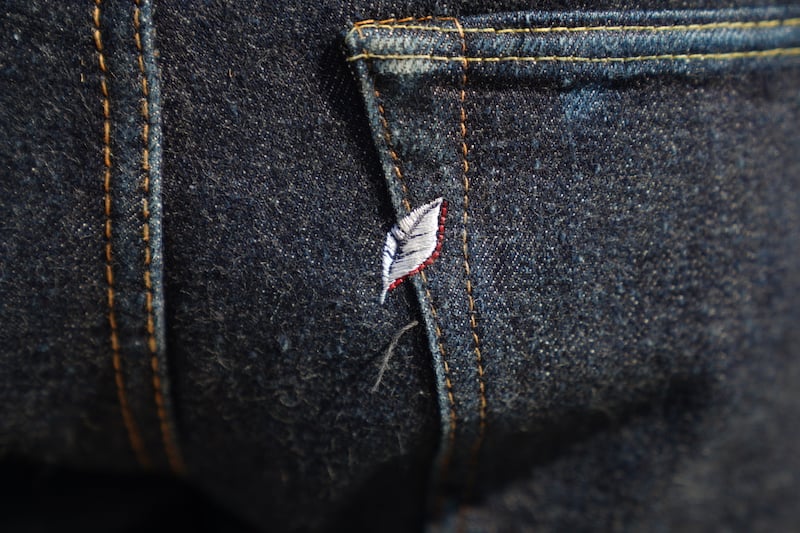
PBJ's calling card is this leaf on the butt, which represents the leaf of the indigofera plant where you get natural indigo. That's an important distinction because most American jeans are made with synthetic indigo, but not this stuff — Pure Blue Japan is one of the few companies that still use real, natural indigo dye.
Some of their jeans use indigo grown in Tokushima, Japan but the jeans that use that are very expensive at over $500. The ones I got are made with powdered, Indian 'natural' indigo, which is still natural indigo and still quite rare!
It's worth noting that the warp is dyed with natural indigo before weaving, which is somewhat unusual, while the weft is undyed.
And of course, people go crazy for the fades. Here's an example:
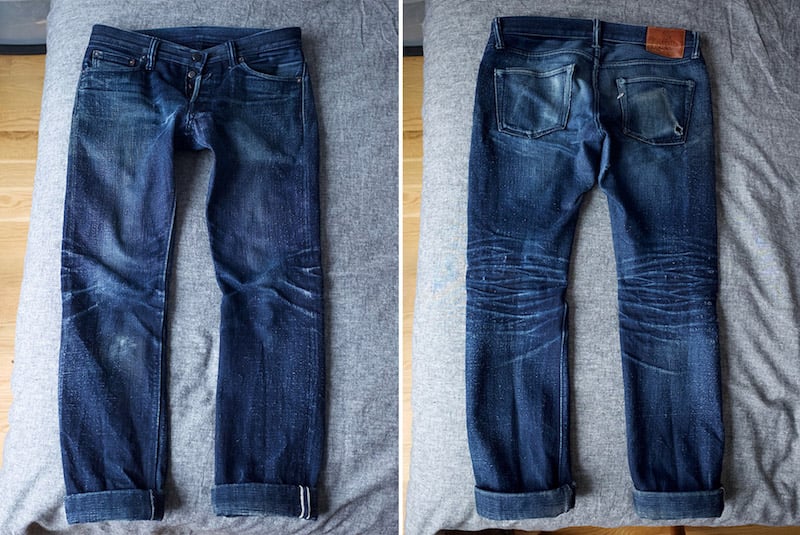
I've only been wearing these for a few weeks, but it has started to brighten up a bit around the crotch, where you can see the blue is becoming more electric blue in some places.
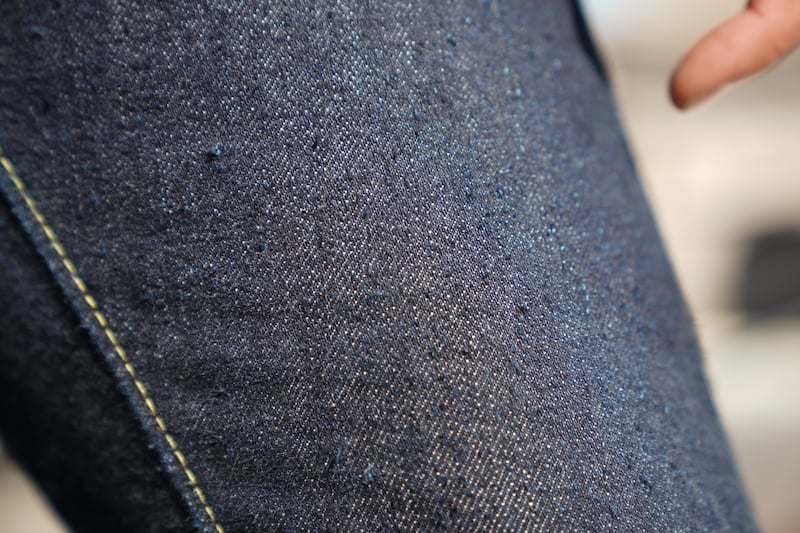
This model, again, is the NP-019 and I believe the NP stands for nep because this is remarkably neppy.
Slub is when the yarn differs in thickness throughout while nep is when the fabric is woven in such a way that the cotton fibers extend from the surface. Both are characteristics that produce this very uneven, irregular texture that denimheads go nuts for.
An interesting tidbit is that PBJ uses primarily American cotton for these jeans because it has less moisture in it than Chinese or Zimbabwean cotton, so it suits the rougher fabrics they want to make.
It's the kind of denim that just has character. It really harkens back to a world where clothing was made with imperfections and not churned out by mass production, and perhaps more importantly, your own character imprints on the jeans. As they age, like a good pair of boots, the fade and patina will reflect your own individual story with the jeans.
[Contrast PBJ with the super smooth denim in my Iron Heart review]

Pure Blue Japan Details
- Indigofera leaf on the butt
- Deerskin leather patch detail
- Iron buttons
- Long stitching
- Light blue selvedge ID
As for the details, the most famous one (again) is the indigo leaf on the butt. I should probably note that a couple of people thought this was a stain, asking if I'd sat in something. That might be a turn off for some consumers, but if you've read this far, you're probably someone who wants people to knowyou're wearing a pair of PBJs and you want that leaf advertising the brand.
After the leaf, the most interesting thing here is the deerskin leather patch. It says Syoaiya on it (it's the same company as PBJ) and it depicts a man dunking jeans into a vat of indigo dye — even though, as I mentioned, they actually dye the threads before weaving. I still love the detail on this patch, though.
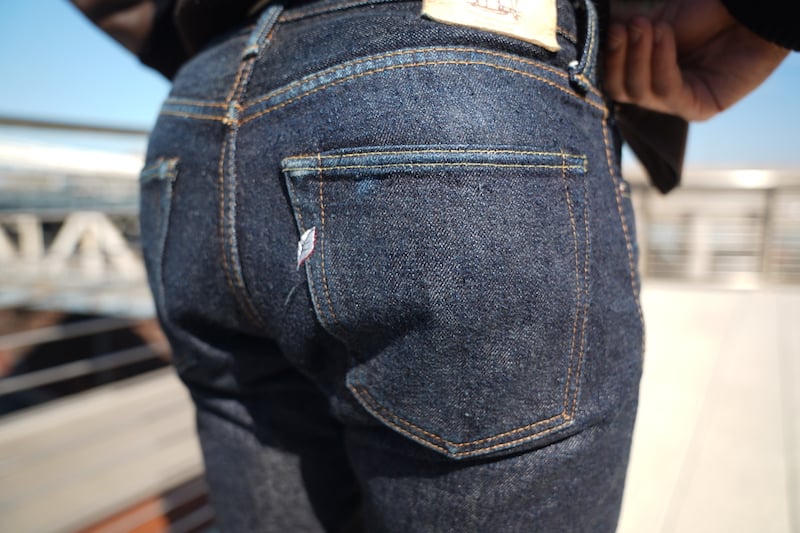
The buttons are made of iron and also have little indigo leaves on them (awesome), and you've got a nice, subtle, light blue selvedge ID poking out from the cuff.
Finally, there's 100% cotton thread stitching, and it's what a lot of people call 'lemon tea', meaning it has two slightly different shades of yellow running along the belt loops and the back pockets. PBJ purposely uses long stitches to differentiate themselves from a lot of other "vintage" makers who tend to use lots of little tiny, close together stitches. This is quite hard to do, and PBJ has to use very modified sewing machines do get it done. Practically nobody will notice, but it's one of the many (many) little touches that elevate these jeans above your $40 pair of Levi's.
[Related: 7 Reasons Japanese Denim Is So Expensive — and Worth Every Penny]
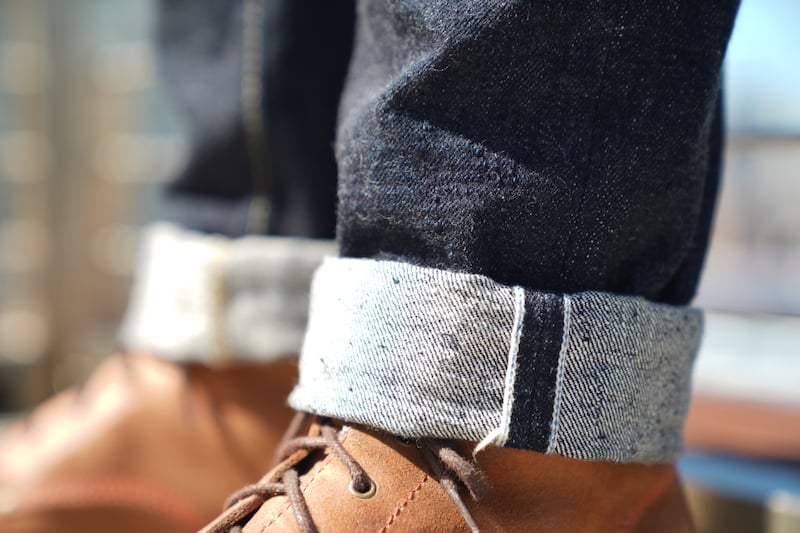
Pure Blue Japan Care
- Everyone has different opinions — machine washing, hand washing, and soaking all seem to be fine
- Don't dry clean them, though
- Color will bleed in water
- Should be stored in well-ventilated area
The label says,
Please wash seperately(sic) from other items as the colors may run due to the nature of indigo and other special dyes.
Sweat, rain and friction during use may result in color transfer on other items.
Please take care when cordinating(sic) this item with light-colored garments. Please store in a well-ventilated place away from direct sunlight and fluorescent light.
So that's the official care advice. When I spoke to the guys at Blue in Green, they said they'd soak it to clean it, or you can hand wash it. Whatever you do don't dry clean it and definitely don't wash it with any other clothes, because these jeans have bled indigo on more than one pair of my boots. These colors do run.
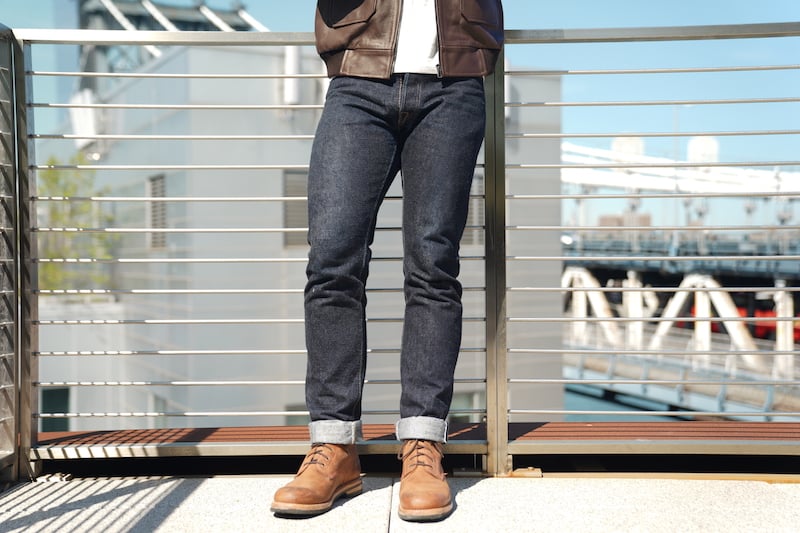
Pure Blue Japan Fit & Sizing
- NP-019 is a relaxed tapered fit
- Order two inches bigger than your normal fit
- Stretches in the first few weeks
These are relaxed tapered so they have roomy thigh, roomy ass, a pretty high rise, and a very dramatic taper down to the legs.
The fit is obviously the most subjective part of the review; everybody's body is different. But I've been cursed with a big butt from birth, and since I like to squat (and, sadly, I only gain muscle on my legs and ass) the Relaxed Tapered is my go-to fit. And these jeans fit me better than any other pair I own.
Now, normally I'm a size 32 but these, like many of my Japanese jeans, are a 34.
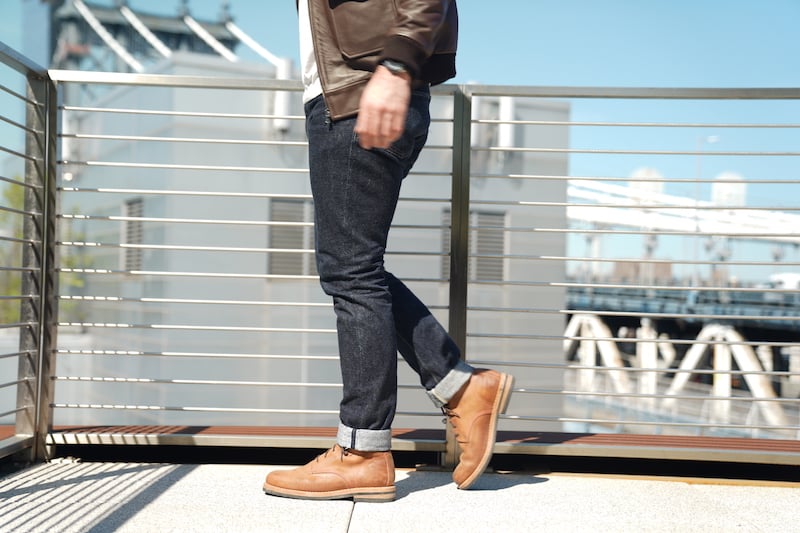
I almost bought a size 36 because the 34 was really quite tight in the store, but in less than a day the 34s had stretched to a place where they was perfectly comfortable, and after about a month I started wearing a belt with them.
[If you prefer stretchier denim, take a look at my Oni's Shin Secret review]
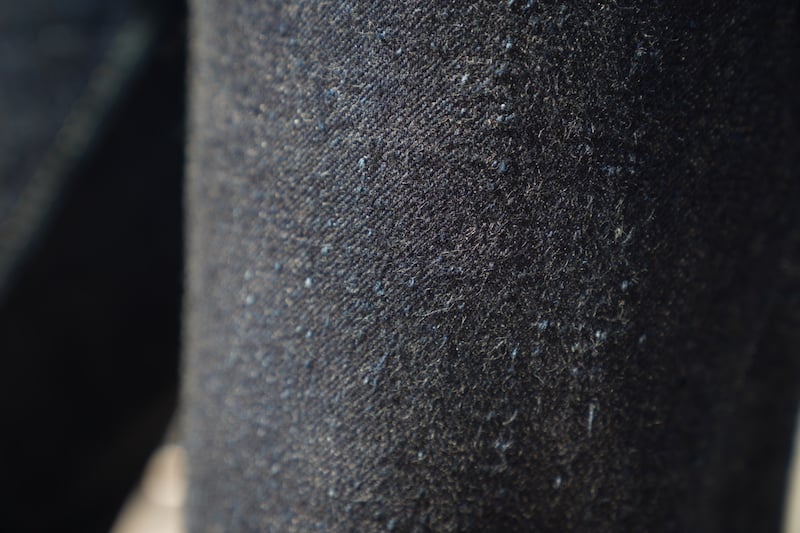
Pure Blue Japan Price
In store, they cost me $363, and after tax it was about $390.
At Okayama Denim they were $290. I didn't love that I paid so much more than they are online, but hey, that's my burden to bear.
In any case, they're pretty expensive, even for Japanese jeans.
This particular model is tough to find online, but Denimio.com has a ton of PBJ jeans and if you make an account and use the code STRIDEWISE, you'll get 10% off. Check out Denimio's Pure Blue Japan collection here.
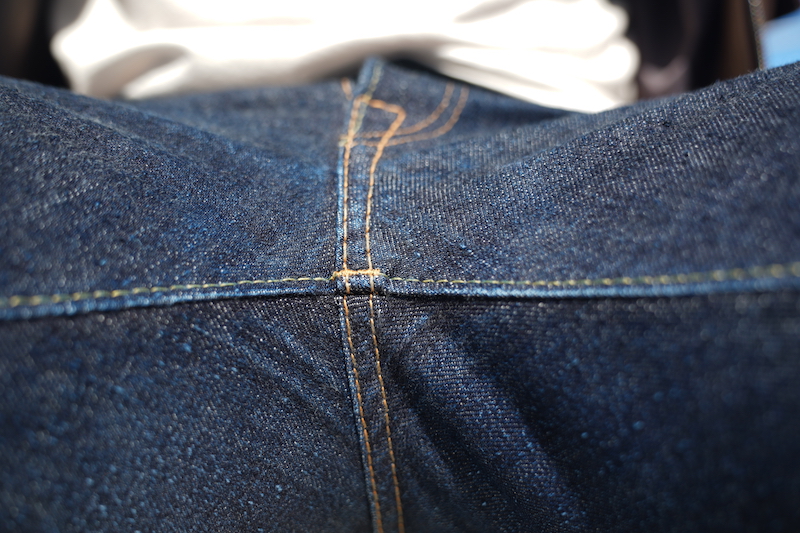
Pure Blue Japan Pros & Cons
Pros
- Notoriously sturdy, solid construction
- Clean stitching, no loose threads after a month of wear
- Gorgeous iron buttons
- Dyed with natural indigo
- Great fade potential
- Absurdly slubby and neppy

Cons
- Hot as shit
- So thick that they're not great for mobility; quite stiff
- Takes a while to fade
- Not much of a con, but remember they'll stretch an inch or two in the first month
- Some think the leaf on the butt looks like a bird poop stain

I'm in love with this jeans. They fit really well, the brand cachet is inimitable, they'll fade well, and I love how sturdy and thick they are. I joke that it feels like a suit of armor, but jeans of this quality and weight really do make you feel like you're well protected from the outside world, a feeling I had never had before I got into Japanese jeans.
If you don't want irregular, flawed-but-flawed-on-purpose denim, you might prefer the uber smooth jeans from Iron Heart.
But PBJ really distills what people love about Japanese jeans:they'll last forever, they'll mold to your own body, they'll tell stories about where they've been, they feel unbelievably strong, and more than anything, the irregular weave and the brand's story suggest a simpler time of handmade, built-to-last, and masculine as all hell clothing. This denim is human. I'm getting buried in these things.
The following two tabs change content below.
- Bio
- Latest Posts
By day: Manhattan-based journalist with reporting experience on four continents, published in Vice, Men's Health, Popular Science, and a bunch of other places.By night: ravenous consumer of anything and everything related to high end men's boots.Stridewise is where I nurture a maniacal obsession with footwear and share my findings. Say hey: [email protected]
Source: https://stridewise.com/pure-blue-japan-review/
0 Response to "Jeans That Fit Like Japan Blue High Taper"
Post a Comment